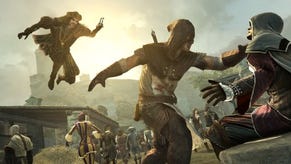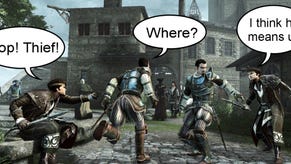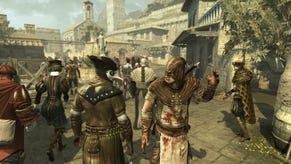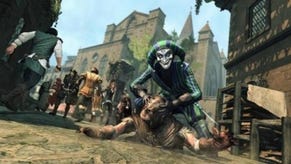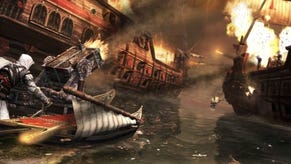Wot I Think: Assassin's Creed Brotherhood
Ubisoft's third Assassin's Creed game arrived on PC on Friday - some four months later than the console version. I poured some time in the Xbox 360 (hissssss) edition late last year, and I've now spent the last week or so with the PC one. Too little too late, or about damned time? Or a bit of both? Here's my verdict.
The game that's least like the Assassin's Creed concept turns out to be the best use of the concept yet. Oh look, a conclusion in the very first line. I've ballsed this one right up, eh? Perhaps; but I'm aware there are preconceptions to be got past here.
Allow me to elaborate. Brotherhood, the third Assassin's Creed (please note, by the way, that I will be employing the shortforms AssCreed and AssBro throughout this piece - this does not demonstrate any contempt for the game, but does perhaps demonstrate that a) I'm lazy b) I remain far too amused by the word 'ass') is not Assassin's Creed 3. No full-blown sequel here, no clean break with the past, no wish list of new features.
Instead, it's a sort of 2.5, perhaps even falling into the strange zone we call 'expandalone.' It documents the continuing adventures of Italian Renaissance-era outlaw-hero Ezio, who is the distance ancestor of present day reluctant science experiment/conspiracy participant Desmond. While so far in AssCreed's short history, the tradition has been to switch to a different ancestor with each new game, this one performs the highly unusual choice of returning to a game's hero once his tale is apparently told. It's a bit like getting to see what happens to a romcom couple after the credits roll. They've got everything they want: everything is resolved for ever and ever, right? Not exactly.
The choice to return to an apparently finished tale and pre-existent character/setting could have been read as a corner-cutting one, flogging a once extremely lively but now surely expired horse. I'm quite sure that could have happened, and this could have been a sorry cash-in to ensure an annual franchise release. Instead, and to Ubisoft's eternal credit, it opts to go deeper rather than simply repeat. It ain't broke, but let's fix it anyway. How can everything be a little bit better, a little bit more open, a little bit more rewarding. In addition, what happens to the hero once the hero's won? While Ezio isn't some god-king figure - and the game wastes little time in pulling a back to square one-ish stunt - he does have some quite remarkable resources at his beck and call, as befitting a man who has apparently already mastered his abilities.
Most ludicrous/wonderful of these are the semi-titular brotherhood. These are collective of AI-controlled henchmen that Ezio can call in for large-scale hits. There's almost zero interaction with them, but that's sort of the point. Click a button, and a cartel of chilling efficient turn up and slay any enemy in sight for you. Either spend your constantly recharging assaso-meter on summoning just a couple, or burn the lot at once for a rain of arrows that see any foe in sight crumple like string-cut puppets. It's like an old-school arcade game special move, but realised in such a way that it isn't anything like a cheat. This is down to another of AssBro's triumphs: its dense, activity-packed city. Auto-clearing one small square of guards doesn't affect Ezio's minute-to-minute existence in grand old Rome. There are always more around the corner, or a clutch of escort or stealth quests in which a hail of AI insta-killers are no use whatsoever. Rome's not a problem you solve in a day, and especially not in a cheeky button-press.
To go back to the start, AssBro is by no means a game of stealth and silent killing. Elements of it are in the mix, but the game is a swollen balloon of things to do. In the right light, it's almost a meta video game: elements of so many genres and games, all draped around the beating heart of its huge and beautiful city. It is Prince of Persia, it is GTA, it is Rainbow Six, it is Tomb Raider, it is Devil May Cry, it is Thief, it is... Well, it's all and none of those games. It is an environment for controlling a virtual action hero in. One thing I don't know if I could definitely say it is is 'Assassin's Creed.' Purely because I'm not even sure what 'Assassin's Creed' means now. The original pitch was a sort of free-form stealth game, where any sort of detection was bad news, crowds were a vital tool to survival and evidence had to be gathered before you could progress. AssCreed 2 evolved what was, in practice, a grating collection of mini-games in a mesmerising setting into a remarkably confident and rewarding action game. AssBro then turns the whole thing into a big old party.
You wanna kill guys? Kill guys! You want to go shopping? Go shopping! You want to buy and renovate property so you can roll around in gold? Yeah, that! You want to go dungeoneering? Go dungeoneering! You want to join an underground fight club? Buy up famous Roman landmarks? Decorate your lair with world-famous art? Yes, yes, yes. You want to be a silent assassin? Er, sure. But why not make a whole lot of sound and fury en route? Go on, it'll be fun! Even the core missions are impressively diverse, forever seeking ways to shake up the mechanics' status quo, diving between raw action, Prince of Persia-style puzzle-acrobatics, stealth and frantic racing, plus a fair few additional gimmicks throw into the mix.
What could, in the wrong light, be seen as feature creep somehow works. It's the city as a playground, but not in the way we often laud such a gaming concept. While a proud chest-thumper in terms of in-game architecture, this isn't a place to watch the world go by, to soak in the atmosphere and marvel at the many quirks of its many people. It's not a simulation. It's an activity centre. Remarkably, this does not devolve into mindless or irritating mini-games, and that's because you develop a personal interest in the activities you pursue. Everything has some degree of levelling up and collectormania. It's not a million miles shy of Farmville, or even MMOs at their worst. Fortunately, this is deftly mitigated by the game having an authoritative understanding of reward. There isn't much in the way of grind or hanging about, but instead throwing yourself into whatever's either nearby or marked on the map as awaiting your interest. You ping between investing in shops, levelling up your assassins and buying new weapons with the same sort of rapid-fire, distracted fluidity as Ezio does from roof to roof. Do what you want. In general, the game has little interest in making you work too hard, and certainly not in suffering. It wants you to play. If you're here seeking a rewardingly cruel challenge, you probably won't find it. AssBro's far more into showering you with gifts and distraction.
As such, I've lost an awful lot of time to it. I keep turning away from to this review (the game alt-tabs beautifully: rejoice!) to see if my assassins have levelled up yet, or if I can afford to buy the Mausoleo di Augusto. Or maybe I could do another mission for Leonardo da Vinci, which might result in another ride in his ludicrous proto-tank, a sort of pedal-powered, land-bound wooden UFO.
Yes, while AssBro goes to great lengths in terms of historical accuracy in some regards, in other it's off the map stooopid. From some of the accents to the omnipotency of Ezio's brotherhood, to his chum da Vinci's theoretical weapons and most of all the prophecy and sci-fi which underpins his links to modern-day descendent Desmond, it has little shame in being absurd. It would probably be a better game were these elements turned down, but it could not be said to truly suffer for them. Mercifully, the 21st century elements are less invasive than ever before, although they are unavoidable if you focus primarily on the core missions. Past a certain point the plot takes over and your freedom dissipates, so take your time, don't hurry, indulge yourself. There really is no pressure until you decide to seek it. The bulk of my time was spent simply going mad in Rome, with no-one telling me what to do except myself and no interruptions by exposition-from-the-future. Endlessly distracted, endlessly compelled to play more.
In a way, I can't imagine a video game in 2011 that's more like a video game in 2011. Once learned, the control system is elegant and natural, but were you to drop someone in without introduction they'd be absolutely lost. There are so many different functions and buttons, so many black and white icons denoting activities or enemies or interactions, so many movement and action combos, so much screaming for your attention and co-ordination at any one time. It is very much a game for gamers, in the way that latter term is broadly understood by the populace at large. To its eternal credit, it hangs together beautifully, my hands doing their thing naturally as my brain conjures dense maps and objectives.
That said, I really didn't get on well with it via keyboard and mouse. Too much needed pressing at once, and Ezio is far more a steered puppet than a perspective. A gamepad is a much more natural fit, heresy as some may find that. It's not a game of accuracy, but of interaction. The compactness, the in-handness of a pad simply makes more sense for this game. In all other senses, it seems as PC a game as any - looks great, runs butter-smooth on my system, and there's no trace of console iconography in the menus. Even the infamous 9-step game exiting procedure in AC1 is a thing of the past. Perhaps the four month wait for a 'proper' PC version was worth it after all. Seriously though: gamepad.
That's true even in multiplayer, another quiet success. Essentially hide and seek, it's also the closet we've had yet to multiplayer Hitman. Each player chooses a visual archetype from the AssBro world - the bird-masked doctors, sinister harlequins, prosthetic-armed nobleman, hooded executioners - then wades into a map full of clones of themselves, and of the other players. You're then given assassination contracts - meant to hunt down a specific individual, with the job lost if you kill an innocent looky-likey. Meantime, you're also being hunted by others. The trick is to act cool, because the increases both points and your chances of sneaking up on a target, whilst being aware and deft enough to avoid death. A little sprint in a corridor when no-one's looking, a short-cut over a roof, a dive into a nearby haystack until trouble has passed... It's a fevered mix of patience and panic, each session rich with an alternating sense of pride and great injustice.
It's a little like The Ship, but without the open comedy (though there's plenty of unintentional comedy when hits go wrong and a conga line of hapless assassins Benny Hill chase each other around town) or the breadth of weaponry. This is small, simple and clever: a heartpounding manhunt. Inevitably, levelling up and unlocks are involved, which certainly makes it more compulsive, but it sucks to be up against foes with more gadgetry than you. Fortunately, it rarely strays far from the essential hide and seek concept - there's nothing even the highest-level target can do about a sudden lunge from the shadows. I don't know how successful it will prove on PC, where we seem to crave more elaborate, precise multiplayer, but it makes a good fist of distilling Assassin's Creed to its barest essence then rebuilding it with competitive play in mind. I'll be popping into it quite a bit, I imagine.
I like AssBro a hell of a lot more than I'd ever expected I would. Partly that preconception was because it's a version 2.5, and partly because even the previous game never quite worked for me despite being a vast improvement over its scatty parent. While fixing many of the first game's many failings, AssCreed 2 didn't seem to find the balance between focused action adventure and wide-open playground, and felt stranded in an unsure middleground. The tools were there, the projects to use them on were not. With all its distractions and its lightness of touch, AssBro is a bizarre game but also a sturdily confident one. It is capable of breaking apart many preconceptions about AssCreed games, and I have little in the way of real hesitation in recommending it. Even the DRM is relaxed enough to no longer raise any hackles - mandatory only at installation, for multiplayer and for access most of the DLC. Offline mode works just fine, although it would be preferable to entirely bypass the Ubisoft launcher and jump straight in the game instead of specifically requesting offline mode.
What a shame, and an indefensible one at that, that it's taken so long to arrive on PC. Four months on from its console release, the buzz around it is all too quiet - so much so that I almost wonder why Ubisoft have bothered. I hope it sells well anyway, because it's the best of the series so far and I'm enormously keen that we get to see future instalments reach PC. That said, those future instalments will presumably move to a new setting now. While I craved that come the end of AssCreed 2, now I feel the opposite - this Italy is a superb playground, and Ezio a fond companion. I'll miss them both. First, though, there are at least forty-eight million side-missions and shopping quests to polish off. I shall be happy for some time yet.








